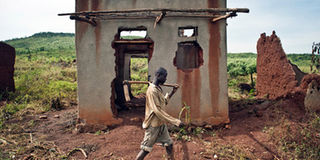Prime
The weak against the strong: Vulnerable people continue to lose land in Mukono

A man walks passed some of the houses that were destroyed to pave way for tree planting.
When Robinah was just a child, she and her three siblings knew that their late father left them land for inheritance and patiently waited on their uncle, to hand over the land when they grow up.
This was, however, not the case, as in 2000, 10 years after their father’s death, their uncle’s wife came snooping if they knew anything about their land. She said yes. Recollecting how they nearly became squatters on their own land, Robinah, 29, a resident of Mukono calls it a ‘long fought battle’.
“From the time our uncle’s wife knew that I was aware we had land, she and my uncle distanced themselves from us. We were mistreated and did not go to school,” Robinah says.
It was only in 2007 when the International Justice Mission, came teaching people about their land rights that they reported their case. This then sparked wrangles between this family and their uncle.
“They were our neighbours and when they heard that we had reported them, they started threatening, they used to send us people to tell us that we will never win the case and that they would rather die than let us have the land,” Robinah adds.
The tempers were calmed only after it was discovered that the title deed was actually given to their uncle’s eldest son.
Land grabbing is by far more common than is usually suspected and more abusive than known. A 2011 study in Lango sub-region by Land and Equity Movement in Uganda estimates that 70 per cent of widows in the region are victims of land grabbing while 90 per cent of un-married and divorced women are victims of the same. In these are embedded thousands of children who are dependent on the widows and divorcees.
Another 2008 study in Mukono by International Justice Mission showed that at least 1,750 widows alone became victims of property grabbing in a three-year period from 2005 to 2007 in just five sub-counties in Mukono. Twenty eight per cent of these victims had been threatened with violence, and 26 per cent of victims were forcefully thrown out of their homes and left destitute. The victims of land grabbing are normally the weak – physically, less wealthy, have no political strings, many times ignorant, widows, old and sick people and orphans.
Ms Clair Rusoke, the Aftercare Specialist IJM Uganda, says after interfacing a lot with these victims, she finds that the underlying triggers to land grabbing include polygamous marriages, informal marriage, and misconceptions about the law or women’s rights.
Between 2005 and 2007, there were 119 succession-related property grabbing cases registered at Mukono Police Station. Only five property grabbing cases resulted in convictions during that time. At the district level, the Mukono Magistrate’s Court registered only 15 property grabbing-related criminal cases in three years, and only four of those cases resulted in convictions, IJM reports found.
Even as the Uganda land law recognises private ownership of land by individuals, families or communities and the state cannot take away any land without compensation, the question that remains unanswered is that why land grabbing continues to occur despite laws in place to protect the vulnerable people against land grabbers.
Ms Judy Adoko, the Executive Director LEMU, says the problem has much to do with the setup of the land ownership systems and procedures of justice. The clan heads, with whom 80 per cent of land is entrusted, are not held accountable for their actions and their decisions can easily be reversed.
“For a long time government did not recognise social governance. Even when customary land tenure system was in place there is no one to hold accountable in the customary land system and its judgments are easily reversed,” Ms Adoko says
The way forward, Ms Adoko says, is to harmonise the traditional and state land system so that all cases of land grabbing start from the LC level.




